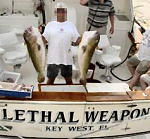 Last week OFAC released its typically opaque monthly report on recently imposed civil penalties. This report reveals that, once again, the full force of the Federal government was brought to bear on two hapless web surfers who bought some Cuban stogies over the Internet. We understand that a spokesman for Fidel Castro said that this OFAC action was the final straw and that Castro was, at last, going to resign and go into alcohol rehab, claiming that it was a serious drinking problem that caused him to become a communist dictator in the first place.
Last week OFAC released its typically opaque monthly report on recently imposed civil penalties. This report reveals that, once again, the full force of the Federal government was brought to bear on two hapless web surfers who bought some Cuban stogies over the Internet. We understand that a spokesman for Fidel Castro said that this OFAC action was the final straw and that Castro was, at last, going to resign and go into alcohol rehab, claiming that it was a serious drinking problem that caused him to become a communist dictator in the first place.
A.N. Deringer, the freight-forwarding company, was fined $700 for helping somebody or other export something or other to Iran.
The Kinecta Federal Credit Union coughed up $3,102 for initiating a funds transfer to a Cuban national. In case you haven’t heard of Kinecta, which started out as the Hughes Aircraft Employees Federal Credit Union, here’s an interesting little quote I found on Kinecta’s website from the its founder:
I went to Mr. Hughes’ office in Hollywood and talked to his secretary Nadine. I gave her all the facts and Mr. Hughes said, ‘Sure. Start the Credit Union. Just keep my name clean. I don’t want anything funny going on.’ I said, you can be sure of that. And Hughes Credit Union was born.
It’s a good thing Howard Hughes is no longer around to hear about this!
Finally a more substantial fine of $66,547.31 (every penny counts!) was imposed on G.E. subsidiary Datex-Ohmeda for shipments of medical equipment through Dubai to Iran made by its former subsidiary Spacelabs Medical . This enforcement action arose from a voluntary disclosure, no doubt one that was insisted on by OSI Systems when it bought Spacelabs from Datex-Ohmeda in 2004. Datex-Ohmeda was forced to spin-off Spacelabs as a condition to GE’s acquisition of Datex-Ohmeda’s parent company. It’s reasonable to suppose that Spacelabs’ Iranian problem was caught by a sharp-eyed lawyer for OSI (not me) during due diligence and that, as a result, OSI required the disclosure and required Datex-Ohmeda to pay any fine.
Oddly this is yet another recent case where medical equipment — which is of course eligible for a license to Iran under TSRA — is shipped without a license. It seems to me a heckuvalot easier just to get the license in the first place rather than go through the whole rigmarole of transshipping the goods through Dubai. What is going on here? Are there a large number of exporters that simply do not know about TSRA?

 Posted by
Posted by  Category:
Category: 

 Steve Clemons, a Senior Fellow at the New America Foundation and a popular blogger who blogs at
Steve Clemons, a Senior Fellow at the New America Foundation and a popular blogger who blogs at  Captain Ted Baier and his charter fishing boat
Captain Ted Baier and his charter fishing boat  For a moment yesterday, it looked like the tide had started to turn on the embargo on Cuba. A
For a moment yesterday, it looked like the tide had started to turn on the embargo on Cuba. A  The ninth annual Habanos Festival just wound up in Havana. The festival, a five day celebration of Cuban cigars, attracts cigar enthusiasts from all over the world — including the United States.
The ninth annual Habanos Festival just wound up in Havana. The festival, a five day celebration of Cuban cigars, attracts cigar enthusiasts from all over the world — including the United States.

